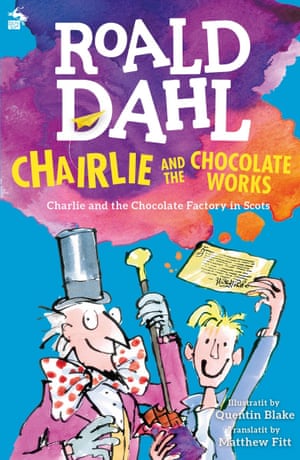Roald Dahl gets 'mair serious' Scots translation
Translator says Chairlie and the Chocolate Works, published to mark the writer’s centenary, avoids some of ‘the honkin and hackit and mingin stuff’

Detail from the cover of Chairlie and the Chocolate Works.
‘Honkin and terrible things’ … detail from the cover of Chairlie and the Chocolate Works.
After much deliberation from translator Matthew Fitt, the Oompa-Loompas have become the Heedrum-Hodrums in the latest in a series of Scots translations of Roald Dahl’s books, Charlie and the Chocolate Factory.
Dahl’s classic 1964 children’s story is renamed Chairlie and the Chocolate Works in Fitt’s translation, published to mark the centenary of the author’s birth. Telling the story of Mr Wullie Wonka’s invitation of five children into his chocolate factory – “Has Violet Boakregarde bitten aff mair than she can chaw? Will Mike Teeveeheid finally end up on TV? Will Chairlie go up and oot in Wullie Wonka’s Muckle Gless Lift?” – it follows in the footsteps of Black & White Publishing’s Scots translation of The BFG, renamed The Guid Freendly Giant, which was released earlier this year.
Novelist and poet Fitt, who has translated Dahl’s The Twits (The Eejits) and George’s Marvellous Medicine (Geordie’s Mingin Medicine) in the past, said at a Scottish Book Trust event in September that coming up with a Scots equivalent for the Oompa-Loompas had been one of the most challenging elements in his latest translation.
“I took ages trying to get one for that,” he said. “You think a oompa, well it’s kinda got a oompa, it’s a kinda trombone sound, oompa, oompa, stick it your joompa feel to it, there’s a musical element. And I was thinking, well how dae ye, ye dae wi this? And I had lots of ideas. I remembered there’s a great word for old-fashioned Scottish music … which is Heedrum-Hodrum and so once I’d settled on that, that was it.”
Charlie and the Chocolate Factory, he said, was one of the more serious of Dahl’s novels. “Although it’s funny, and it’s honkin and terrible things happen to the bairns in the story, the spoilt bairns, it seems to be a much mair serious, one of the mair serious Roald Dahl stories. Because the story begins in poverty and Chairlie and his grandfaither … are jist aboot dying o starvation and he looks longingly at this chocolate factory and wins this gowden ticket,” Fitt said. “I think that there is a much mair sophisticated development of the relationship between Wullie Wonka and who he is, as a person. And daeing that in Scots was great because it didnae aw have to be the honkin and hackit and mingin stuff, you could tell some o the mair serious parts of life.”
But taking on any translation of Dahl was, he admitted, “a bit worrying to start with”, particularly with the plethora of words the author made up.
Fitt said he hoped Dahl would have appreciated his efforts. “He would, a wid hope. Quentin Blake, the illustrator of Roald Dahl’s books, he got a copy of one of the translations I did a wee while ago …. I think it was The Eejits, and he keeps it on his mantelpiece in his studio in London. [He says] that’s his favourite edition of any of the Roald Dahl books that he’s worked on, which was brilliant for us, but it’s also great for the Scots language to hear that folk ootside Scotland think it’s great and think it’s valuable.”
No comments:
Post a Comment